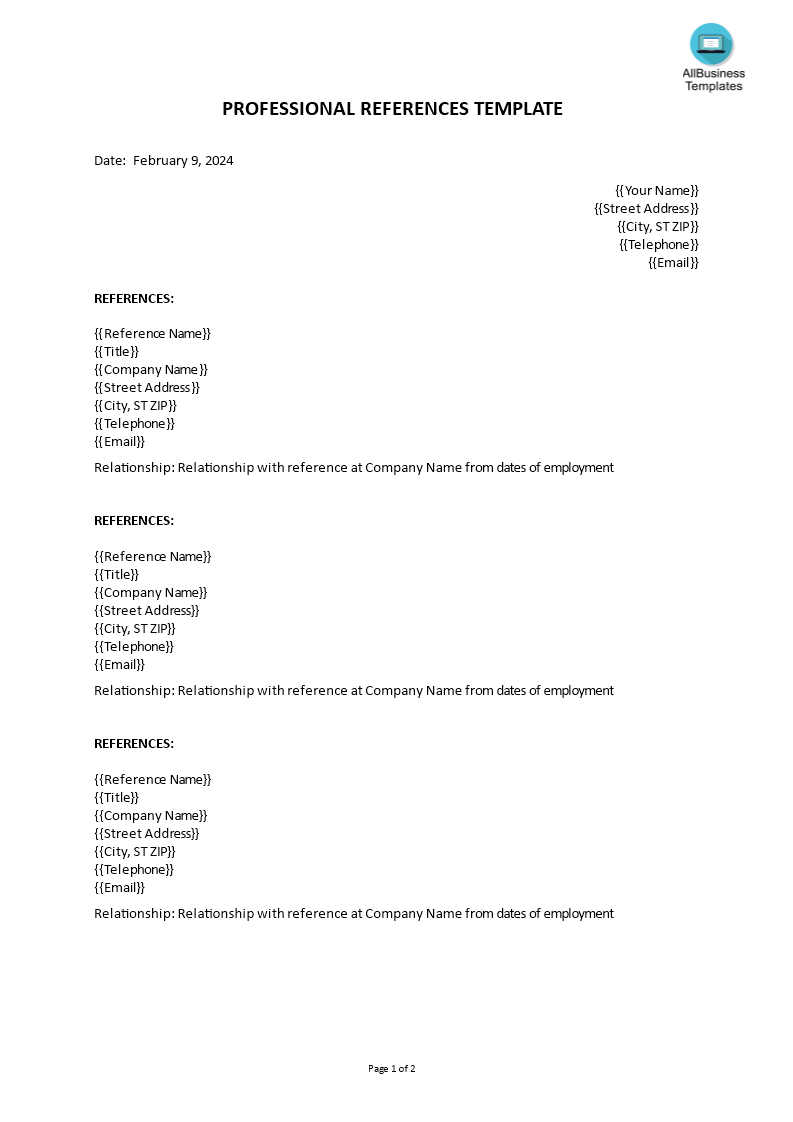Professional References Template
Sponsored Link免费模板 保存,填空,打印,三步搞定!

Download Professional References Template
微软的词 (.docx)免费文件转换
- 本文档已通过专业认证
- 100%可定制
- 这是一个数字下载 (64.83 kB)
- 语: English
Sponsored Link
What should be included in a professional reference? What format should a reference list have? This template will help you create impressive references quickly and easily. It includes all the necessary fields, such as name, contact information, and a brief description of the individual's qualifications. It also includes a section for the employer's signature.
Professional references are individuals who can provide information about your qualifications, work history, and character to potential employers. These references are typically people you have worked with in a professional capacity and who can vouch for your skills, work ethic, and suitability for a job. Professional references play a crucial role in the job application and hiring process, as they offer insight into your past performance and how you are likely to perform in a new role.
Here are some key points to understand about professional references:
- Types of Professional References: Professional references can come from various sources, including former or current employers, supervisors, colleagues, clients, mentors, or business associates. It's important to choose references who have direct knowledge of your work and can speak to your abilities and character.
- Contact Information: When listing professional references on a job application or providing their contact information to potential employers, you should include their full name, job title, the name of their organization, email address, and phone number. Make sure the contact information is up to date.
- Permission: Always obtain the consent of your professional references before listing them on your job applications or sharing their contact information with potential employers. It's courteous and ensures they are prepared to speak on your behalf.
- Relevance to the Job: Tailor your choice of professional references to the job you are applying for. If the position requires specific skills or experience, consider references who can best speak to your qualifications in those areas.
- Relationship Building: Maintain positive professional relationships with your references. Stay in touch, update them on your career progress, and express your gratitude for their support.
- Reference Letters: In some cases, you may be asked to provide reference letters from your professional references. These are written statements in which your references detail your qualifications and their positive experiences working with you.
- Character and Work Ethic: Professional references can speak to your character, integrity, work ethic, problem-solving skills, ability to collaborate, and how you handle challenges. They may also provide examples of your accomplishments and contributions.
- Employer Policies: Be aware of your current or former employer's policies regarding references. Some organizations have strict policies that limit what information can be provided about former employees.
- Diversity of References: It's beneficial to have a mix of professional references, including supervisors, colleagues, and clients, to offer a well-rounded perspective of your abilities and character.
- Relationship Maintenance: Keep your references informed about your job search, provide them with the details of the positions you're applying for, and, if possible, offer a copy of your resume. This helps them provide more relevant and supportive feedback to potential employers.
Professional references are an important aspect of the job application process, as they can significantly influence an employer's decision to hire you. Select your professional references carefully, nurture these relationships, and make sure they are well-prepared to speak positively about your qualifications and character when called upon by potential employers.
Click directly on 'Open with Google Docs' or download our sample professional reference template as a Word template now to enhance efficiency! Your success in delivering a well-structured and effective proffessional reference awaits.
DISCLAIMER
Nothing on this site shall be considered legal advice and no attorney-client relationship is established.
发表评论。 如果您有任何问题或意见,请随时在下面发布
相关文件
Sponsored Link

